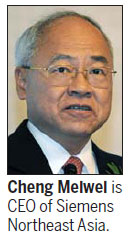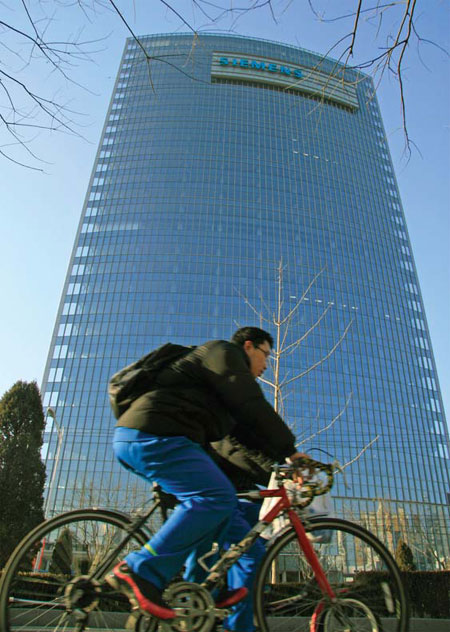Ambitions cloaked in green
Updated: 2012-11-30 06:47
By Meng Jing (China Daily)
|
||||||||
|
Cheng Meiwei, CEO of Siemens Northeast Asia, whose China headquarters in Beijing is shown above, says China will play a big role in the company's growth. Xu Xiaolin / for China Daily |
German company siemens looks to environmental products to bolster its fortunes in China
As Siemens evolves into one of the world's largest suppliers of eco-friendly technologies, China will play a much bigger role in the German conglomerate's future growth, says one of the company's senior executives.
China's focus on improving energy efficiency and reducing carbon emissions may help the country surpass the United States as the company's top overseas market in the coming years, says Cheng Meiwei, CEO of Siemens Northeast Asia.
"China is the second-largest overseas market for Siemens, right after the US. With such strong desire to go green in China, the Unites States' position as our top overseas market is not that unshakable as it was before," he says.
Cheng's comment came not long after the German conglomerate announced on Nov 8 its plan to reduce its costs by 6 billion euros ($7.7 billion), the same day Siemens reported a 7 percent growth in revenue in fiscal 2012, compared with the previous year. It also reported a 10 percent year-on-year decline in new orders.
Although Siemens had one of its best operating results in fiscal 2012 with revenue of 78.3 billion euros, the company said in a news release that it fell behind on its objectives.
To get back to reaching its goals, the company recently launched "Siemens 2014", a two-year program aimed at raising profit margins across all of its sectors from its current total mark of 9.5 percent to 12 percent by the end of September 2014.
In doing so, the company plans to increase its competitiveness by "restructuring its products portfolio". Environmental solutions and products are one of its expertise.
In fiscal 2011, Siemens said it generated revenue of 30 billion euros with its environmental products and solutions portfolio - an amount equal to about 40 percent of the company's total sales and a 9 percent increase over fiscal 2010.

The company wants to increase revenue from its environmental products and solutions portfolio to at least 40 billion euros by the end of fiscal 2014.
"China's 12th Five-Year Plan (2011-15) is tailor-made for Siemens," says Cheng, who is also president and CEO of Siemens China. "All four business units we have can cater to the needs of China in terms of sustainable development."
Cheng, who joined Siemens in late 2010, says the company's four business units - industry, energy, healthcare and infrastructure - have generated 6.39 billion euros in revenue in China for fiscal 2011. All are equally important in helping China reduce its consumption of energy, increase efficiency and reduce carbon emissions.
He says Siemens has a massive product portfolio, ranging from home appliances, transmission systems and green building solutions to products for high-speed trains and subways.
Siemens' power transmission technology, for instance, helped the 1,400-kilometer transmission system from Southwest China's Yunnan province to South China's Guangdong to experience only a 5 percent power loss.
In its infrastructure and cities sector, its braking technology can help subway systems greatly cut the energy used in frequent stops.
"China can benefit from each of the sectors to go green, and the growth of each sector will benefit from a greener China," Cheng says.
Although it is unclear what percentage of Siemens' 30 billion euros in sales of environmental products is generated in China, Liao Ning, Siemens' chief engineer of building technology in South China, says he has seen strong demand for greener buildings in China.
"When I started to do this in 2008, I had to really push to sell our solutions. But now people are following me, asking if we can help to save energy for their buildings."
He says that for a building with a life span of 30 years, operating and maintaining it accounts for 80 percent of total costs, and the investment on design and construction for the rest.
"Now, especially with the slowing of China's economy, there is an increasing interest from manufacturers to cut energy consumption in their factories in an effort to cut costs and increase profits," he says.
But not every line of Siemens' business is immune to China's slowdown. Cheng says growth for Siemens China has not been as rapid as it was in fiscal 2011, when revenue grew 18.5 percent year-on-year.
He would not give details about Siemens' business performance this year, but says that Siemens' investments in China are a long-term strategy.
"There is an old saying by Siemens' founder Werner von Siemens: 'I will not have the short-term profit jeopardize my long-term future,'" he says.
Over the past year, the company has increased the number of its division branches in China from 65 to 73. It has about 2,000 scientists and experts in Siemens China's research and development team who are set to bring more technologies and solutions from developed markets to help China reach its sustainable development goals.
"As our CEO always says 'I never miss a good crisis'. Plus, I think China's economy has already hit the base and it will start to rebound next year," Cheng says.
Siemens is clearly not the only company that has its eyes on the blossoming business opportunities lying in China's sustainable development.
Claudio Facchin, chairman and president of ABB China, says the Switzerland-based power and automation technology company will benefit from China's 12th Five-Year Plan that focuses on energy efficiency, industrial productivity and a lower environmental impact.
The French electrical engineering giant Schneider Electric has also been ramping up its business in China since the beginning of this year in an effort to popularize its Smart City Solutions, which uses different kinds of smart technologies to efficiently manage a city's resources.
However, Siemens feels its broad spectrum of products for cities gives it a competitive edge.
"You can practically do one-stop shopping here with Siemens. We even have Siemens Financial Services to offer financing solutions, whether it is the investment to remake your building with energy-saving solutions or financing with even larger public projects, we can help," Cheng says.
"Last year we helped with 4 billion yuan ($642 million, 497 million euros) in all kinds of financing projects in China. There has been no financing program in China that is too big for us to take so far. We are looking forward to having bigger projects."
mengjing@chinadaily.com.cn
(China Daily 11/30/2012 page11)

 Relief reaches isolated village
Relief reaches isolated village
 Rainfall poses new threats to quake-hit region
Rainfall poses new threats to quake-hit region
 Funerals begin for Boston bombing victims
Funerals begin for Boston bombing victims
 Quake takeaway from China's Air Force
Quake takeaway from China's Air Force
 Obama celebrates young inventors at science fair
Obama celebrates young inventors at science fair
 Earth Day marked around the world
Earth Day marked around the world
 Volunteer team helping students find sense of normalcy
Volunteer team helping students find sense of normalcy
 Ethnic groups quick to join rescue efforts
Ethnic groups quick to join rescue efforts
Most Viewed
Editor's Picks

|

|

|

|

|

|
Today's Top News
Chinese fleet drives out Japan's boats from Diaoyu
Health new priority for quake zone
Inspired by Guan, more Chinese pick up golf
Russia criticizes US reports on human rights
China, ROK criticize visits to shrine
Sino-US shared interests emphasized
China 'aims to share its dream with world'
Chinese president appoints 5 new ambassadors
US Weekly

|

|







